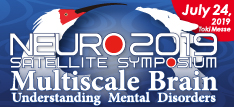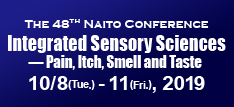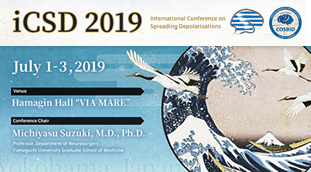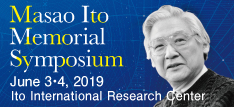Satellite Programs
Satellite Symposia
The 1st International Symposium of "Multi-scale Brain"
-Constructive Understanding of Multi-scale Dynamism of Neuropsychiatric Disorders-
| Date | July 24, 2019 12:00 - 20:00 |
|---|---|
| Venue | Toki Messe Room 201A |
| Sponsor | Scientific Research on Innovative Area "Multi-scale Brain" |
| Organizers | Akiko Hayashi-Takagi(RIKEN, CBS, Lab for Multi-scale Biological Psychiatry) |
| Speakers | Pierre Vanderhaeghen(VIB/KU Leuven Centre, Université Libre de Bruxelles , Belgium) Hailan Hu(Interdisciplinary Institute of Neuroscience and Technology Zhejiang University School of Medicine, China) Rainbo Hultman(The Iowa Neuroscience Institute, USA) Zhen Yan(Department of Physiology and Biophysics, Jacobs School of Medicine & Biomedical Sciences, SUNY at Buffalo, USA) Akiko Hayashi-Takagi(RIKEN, CBS, Lab for Multi-scale Biological Psychiatry) Taro Toyoizumi(RIKEN Center for Brain Science) Tomoyuki Furuyashiki(Kobe University Graduate School of Medicine) Yasunori Hayashi(Kyoto University Graduate School of Medicine) |
| Purpose of the symposium | Despite extensive recent efforts, the pathogenesis of psychiatric disorders remains poorly understood, mainly because their pathophysiology is a synergistic interaction between multiple genes variants and environmental factors. Thus, what we recently know as contributory factors for the diseases is the susceptible gene variants (Molecular layer), synaptopathy (Subcellular and Cell layer), alteration in neuronal circuits (Circuit layer), conceivably resulting in the behavioral manifestations (Individual layer). However, the understanding of each layer has been limited within a single layer, which hinders the integrative and causal mechanistic understanding of behaviors. Probably, each layer can affect one another, macroscale to the mesoscale and then to the microscale layer or vice versa. Here, we organize an international satellite symposium to study these phenomena of intricate complexity of psychiatric disorders that are governed by various mechanisms integrated across multiscale layers. Eight leading scientists in this field will discuss how to make progress in this challenging problem. |
| Contact information | Akiko Hayashi-Takagi Email: hayashitakagi@gunma-u.ac.jp Tel: 027-220-8854 Hiroyuki Nawa Email: hnawa@bri.niigata-u.ac.jp Tel: 025-227-0613 |
The principle of neocortical development and evolution
| Date | July 30, 2019 |
|---|---|
| Venue | Tokyo Metropolitan Institute of Medical Science, Auditorium |
| Sponsor | Tokyo Metropolitan Institute of Medical Science |
| Organizers | Chiaki Ohtaka-Maruyama(Tokyo Metropolitan Institute of Medical Science) Tadashi Nomura(Kyoto Prefectural University of Medicine) |
| Speakers | Zoltan Molnar(Univ. of Oxford) Linda Richards(Univ. of Queensland) Federico Calegari(Technische Univ.of Dresden) Victor Borrell(Univ.of Miguel Hernández) Patrik Kanold(Univ. of Maryland) Gentaro Taga(Univ. of Tokyo) Nobuhiko Yamamoto(Osaka Univ.) Kazunori Nakajima(Keio Univ.) Carina Hanashima(Waseda Univ.) Tadashi Nomura(Kyoto Pref.Univ.Med) Chiaki Ohtaka-Maruyma(Tokyo Metropol. Inst. Med.Sci.) |
| Purpose of the symposium | The cerebral cortex is responsible for higher brain functions, such as conscious thought and language in humans. In the human neocortex, billions of neurons are precisely arranged in a six-layered structure. The question we ask is “How is this amazing organ developed during embryogenesis and evolved during evolution?”. The cerebral cortex structure is formed by the sequential generations of many neurons and their migration towards the brain surface in the limited fetal period. Moreover, accurate axon targeting in the neonatal stage is reproducibly realized in the vertebrate development. The aim of this symposium is to deepen our understanding of the principles of cerebral cortex formation and evolution by discussing with renowned scientists at home and abroad. |
| Contact information | Chiaki Ohtaka-Maruyama Email: maruyama-ck@igakuken.or.jp Tel: 03(6834)2367 |
The 12nd Neurochemistry Seminar for Young Scientists
| Date | July 24, 2019 17:00 - / July 25, 2019 20:00 - |
|---|---|
| Venue | Hotel Okura Niigata |
| Sponsor | The Japanese Society for Neurochemistry |
| Organizers | Miho Terunuma(Niigata University) Izumi Iida(Niigata University) |
| Speakers | Ryuta Koyamar(The University of Tokyo) Kenji Sakimura(Niigata University) Kohtaro Takeii(Yokohama City University) Hirohide Takebayashi(Niigata University) Miho Terunuma(Niigata University) Atsumi Nitta(University of Toyama) Hiroko Baba(Tokyo University of Pharmacy and Life Sciences) Masabumi Minami(Hokkaido University) Hiroaki Wake(Kobe University) Keiji Wada(National Center of Neurology and Psychiatry) |
| Purpose of the symposium | The Japanese Society for Neurochemistry prepares a unique 2-day seminar for graduate students, post-docs and other scientists during the annual meeting. The purpose of the seminar is to provide levels of experiences such as lectures from the world leading scientists, and information exchange and discussion among the members. |
| Contact information | Miho Terunuma Email: mterunuma@dent.niigata-u.ac.jp Tel: 025-227-2827 |
New understanding of Basal ganglia in health and disease (a tentative title)
| Date | July 24, 2019 |
|---|---|
| Venue | Toki Messe Room 306+307 |
| Sponsor | Grant-in-Aid for Scientific Research on Innovative Areas Non-linear Neuro-oscillology: Towards Integrative Understanding of Human Nature |
| Organizers | Atsushi Nambu(National Institute for Physiological Sciences) Toshikuni Sasaoka(Brain Research Institute, Niigata University) |
| Program | https://www.nips.ac.jp/sysnp/Symposium/BG2019/program.html |
| Speakers | Angela Cenci Nilsson (Lund University, Sweden) Dwi Wahyu Indriani (National Institute for Physiological Sciences) Yanyan Wang (Univ. Illinois, USA) Takashi Kitsukawa (Osaka University) Taku Hasegawa (National Institute for Physiological Sciences) Nozomu Yoshioka (Niigata University School of Medicine) Ken-ichi Amemori (Primate Research Institute , Kyoto University) Masato Kanazawa (Brain Research Institute, Niigata University) Masayuki Matsumoto (Tsukuba University) Yasuhiro Tanaka (University of Tokyo/Tamagawa University) Toshikuni Sasaoka (Brain Research Institute, Niigata University) |
| Purpose of the symposium | The basal ganglia has been thought to be mainly involved in motor control, but recently it has an important role in information processing of reward and attention, and dysfunction of the basal ganglia has been linked to many non-motor symptoms in addition to movement disorders. It has become clear that the spread of the basal ganglia function is attracting attention. In this symposium Professor Angela Cenci Nilsson who is a leading researcher in this field and a speaker of the Symposium on Neuro 2019 Symposium on Neurochemistry (July 27 afternoon) with leading researchers from Japan will discuss latest researches regarding the function of dopamine in the basal ganglia,the diseases of basal ganglia such as Parkinson's disease and dyskinesia, new therapeutic strategies, and the latest research on involvement in cognitive function and emotion, and we would like to look into the future. |
| Co-sponsored | Grant-in-Aid for Scientific Research on Innovative Areas Non-linear Neuro-oscillology: Towards Integrative Understanding of Human Nature |
| Contact information | Toshikuni Sasaoka Email: sasaoka@bri.niigata-u.ac.jp Tel: 025-227-2163 |
Call for Proposals for Satellite Programs
Proposals for satellite programs at NEURO2019 are now invited. Some rooms in Toki Messe are available for satellite programs on the day before the meeting, Wednesday, July 24. Proposals approved as official satellite programs can use the name of “NEURO2019 Satellite Program”.
We provide the following publicity.
- Publication in the Meeting Program (Free)
- Publication on the Meeting Website (including possible links to satellite Websites) (Free)
- Banner advertisement on the Meeting Website (Charged option: JPY 108,000 included tax)
- Publication in NEURO2019 E-Newsletter (E-mail magazine)
Organizations wishing to hold satellite programs are requested to download the application form and send it to NEURO2019 Secretariat at neuro2019@aeplan.co.jp. We accept the applications for the use of rooms on a first-come-first served basis.
Required information
- Program title (Theme)
- Date, time and venue
- Expected number of attendees (only for those wishing to use rooms of Toki Messe)
- Host Organization
- Organizer (s) (name (s), affiliation (s) and contact information)
- Speakers (names and affiliations)
- Banner advertisement on the Meeting Website (Charged Option)
- Registration fees, registration method and maximum number of attendees
- Purpose of the Program
- Special comments including names of co-host or sponsor if applicable
Notes
- The Executive Committee will take the venue, scale, and other factors given in the application into consideration for the confirmation of official satellite seminars when responding to applications. Please kindly understand that we cannot meet all requests.
- At least one organizer must be a member of the Japan Neuroscience Society or the Japanese Society for Neurochemistry.
- NEURO2019 has the status of co-host, and will not be involved with the running of the programs.
- Please ensure that programs do not overlap with the main program of NEURO2019 (including events such as receptions).
Venues
Some rooms of Toki Messe may be available for satellite programs on the day before the meeting depending on time and room type. Please contact NEURO2019 Secretariat for room availability.
Host organizations of satellite programs are responsible for paying for the use of the venue and equipment including audio and visual electronics.
[July 24 (Wed): Approximate room prices for the day before the meeting]
- Medium-sized Conference Room (200 seats) – 2 rooms are available
*Price varies by time of day.
10:00-21:00 Approx. 450,000 JPY
15:00-21:00 Approx. 400,000 JPY
- Small-sized Conference Room (100 seats) – 2 rooms are available
15:00-21:00 Approx. 350,000 JPY

Medium-sized Conference Rooms – Room 301 and 302
Small-sized Conference Rooms – Room 201A and 201B (Room 201, a medium-sized room will be divided into 2 small rooms)
NEURO2019 Secretariat
6F Shin-Osaka Grand Bldg., 2-14-14 Miyahara, Yodogawa-ku, Osaka 532-0003, Japan
(c/o A & E Planning, Co., Ltd)
Tel: +81-6-6350-7163 Fax: +81-6-6350-7164
E-mail: neuro2019@aeplan.co.jp










